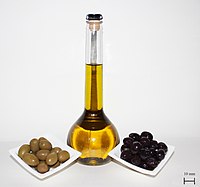
Photo from wikipedia
PurposeDespite the fact that extra virgin olive oil (EVOO) is widely used in obese individuals to treat cardiovascular diseases, the role of EVOO on weight/fat reduction remains unclear. We investigated… Click to show full abstract
PurposeDespite the fact that extra virgin olive oil (EVOO) is widely used in obese individuals to treat cardiovascular diseases, the role of EVOO on weight/fat reduction remains unclear. We investigated the effects of energy-restricted diet containing EVOO on body composition and metabolic disruptions related to obesity.MethodsThis is a randomized, double-blinded, placebo-controlled clinical trial in which 41 adult women with excess body fat (mean ± SD 27.0 ± 0.9 year old, 46.8 ± 0.6% of total body fat) received daily high-fat breakfasts containing 25 mL of soybean oil (control group, n = 20) or EVOO (EVOO group, n = 21) during nine consecutive weeks. Breakfasts were part of an energy-restricted normal-fat diets (−2090 kJ, ~32%E from fat). Anthropometric and dual-energy X-ray absorptiometry were assessed, and fasting blood was collected on the first and last day of the experiment.ResultsFat loss was ~80% higher on EVOO compared to the control group (mean ± SE: −2.4 ± 0.3 kg vs. −1.3 ± 0.4 kg, P = 0.037). EVOO also reduced diastolic blood pressure when compared to control (–5.1 ± 1.6 mmHg vs. +0.3 ± 1.2 mmHg, P = 0.011). Within-group differences (P < 0.050) were observed for HDL-c (−2.9 ± 1.2 mmol/L) and IL-10 (+0.9 ± 0.1 pg/mL) in control group, and for serum creatinine (+0.04 ± 0.01 µmol/L) and alkaline phosphatase (−3.3 ± 1.8 IU/L) in the EVOO group. There was also a trend for IL-1β EVOO reduction (−0.3 ± 0.1 pg/mL, P = 0.060).ConclusionEVOO consumption reduced body fat and improved blood pressure. Our results indicate that EVOO should be included into energy-restricted programs for obesity treatment.
Journal Title: European Journal of Nutrition
Year Published: 2017
Link to full text (if available)
Share on Social Media: Sign Up to like & get
recommendations!